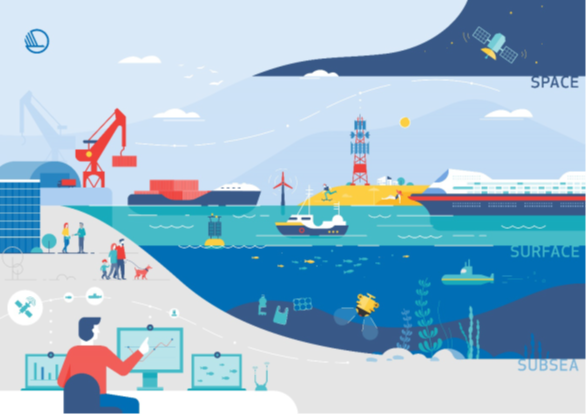The ocean, seas, coastal and inland waters form a single system which all life depends on. They are places of leisure, of well-being, of trade, and represent an ever-growing area of importance for the economy and future growth of the Nordic region.
For most sectors dependent on the ocean, ‘business as usual’ will not be enough if we are to transform our ocean economy. The Nordic countries have a unique opportunity to take a leading role at the international level, becoming a frontrunner in the development of a sustainable ocean economy.

The challenge
The ocean connects the Nordic region, and is a vital source for e.g. trade, jobs, energy, food, and for our future economic growth.
According to the OECD, the value generated by ocean-based industries could more than double in size by 2030 – presenting great opportunities for future growth, new business opportunities, and economic development. This means that we must protect the ocean while sustainably unlocking its vast potential.
Nordic stakeholders should look towards cross-sectoral partnerships as key towards developing innovative solutions. The Nordic countries must engage in cross-border knowledge-sharing and joint technological development that will be vital in transforming their ocean economies.
The objectives
Nordic Innovation's Sustainable Ocean Economy program aims to strengthen Nordic ocean-based industries by promoting cross-border collaboration, and by creating new opportunities for growth and innovation in the region.
This will support the development of a truly sustainable ocean economy in the Nordics.
The approach
The program builds on an ecosystem approach with three overarching dimensions: space, surface, and subsea.
As a first step, a mapping of Nordic strongholds in the Nordic Sustainable Ocean Economy Ecosystem and Strongholds was conducted. The mapping is a cornerstone for the program as a whole. The mapping will serve as a cornerstone for the work ahead. Stay tuned for further information on the program and upcoming activities. Download it below:
The program is divided into three topical areas: Ocean-based biomass, cross-sectoral and co-located activities, and testbed network.
Ocean-based biomass
Environmentally responsible commercial farming of ocean-based biomass, such as seaweed and algae, for food, feed, and alternative sustainable products. There is already a lot of innovation in this area, as well as strong Nordic know-how and huge future potential. The area is of interest both to bigger industry actors and to start-up and scale-up businesses that would benefit from increased Nordic cooperation and awareness of on-going developments.
Cross-sectoral and co-located activities
Smart and sustainable activities within different economic sectors that share the same marine space, such as offshore renewable energy installations combined with aquaculture. The concept is garnering increasing attention internationally, as efficient and sustainable use of ocean sites becomes more crucial. In this area, there is a lot of know-how and technology development in the Nordics, in particular when it comes to the use of data and digital solutions for remote and predictive monitoring.
Testbed network
A network of Nordic testbeds for the sustainable ocean economy. The aim is to cross-fertilize know-how, technologies, and capabilities across borders and sectors. This will be done through networking activities, followed by support to a few selected ideas for further action.

